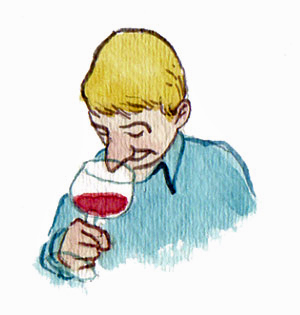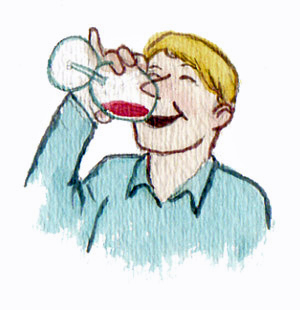

Your genetic structure may determine the wines you like to taste and smell. Some people have a genetic makeup that lets them like everything. These lucky souls are called "supertasters."
Your Genetics May Determine
The Wines You Prefer
Do we have a genetic makeup that determines everything we taste and thus like and dislike?
by
Dan Berger
April 21, 2008
 or the last few years, a number of long-time wine industry observers, many of them in England, have addressed what they believe to be a great fallacy in the scoring of wines on a rigid, numerical basis. Their criticism is that a small number of mostly American evaluators seem to be smitten by a style of wine that the critics view as antithetical to the classic view of what a great wine ought to be.
or the last few years, a number of long-time wine industry observers, many of them in England, have addressed what they believe to be a great fallacy in the scoring of wines on a rigid, numerical basis. Their criticism is that a small number of mostly American evaluators seem to be smitten by a style of wine that the critics view as antithetical to the classic view of what a great wine ought to be.
Clive Coates, the noted French wine author, recently called to task one American critic (not by name) who loved a particularly controversial red Bordeaux. Wrote Coates, “Anyone who likes [that wine] should have a brain transplant.” It was almost as if the Brits viewed the Americans as being somehow genetically different from Europeans as far as wine tasting is concerned.
And evidence is beginning to emerge that how we taste differs radically from person to person. The latest bit of evidence regarding wine tasting’s connection to a hard-wired status comes from DNA research, and the investigation of the physiology of taste by scientists and amateurs alike.
Some of this research seems to be saying clearly that numerical scores that rate the putative quality of a wine really are little more than opinions, not in any way related to fact, because it is increasingly clear that each individual tastes differently - one man’s greatness is another’s gruel - and what we perceive, or fail to experience, may be related to what we were born with. Or not.
 Some of the research seems to indicate that our genetic makeup may well be as much a factor of how and what we smell and taste as any learned experience, certainly with regard to specific aromas and tastes. And, in fact, it is patently clear that some among us cannot sense certain elements, and that others have such an acute sense of the same elements that even a trace is overpoweringly noxious.
Some of the research seems to indicate that our genetic makeup may well be as much a factor of how and what we smell and taste as any learned experience, certainly with regard to specific aromas and tastes. And, in fact, it is patently clear that some among us cannot sense certain elements, and that others have such an acute sense of the same elements that even a trace is overpoweringly noxious.
Moreover, we’re beginning to see that much of this is beyond our control. It is who we are that determines what we like and dislike. And although learning through a posteriori experience does play a role in our appreciation of certain aspects of wine, a lot of that presumably is limited to what we can sense and how we sense it.
And those who use numbers to persuade us that something is sensational (a score of 99) or wretched (a score of 58) are trying to persuade in a manner that recalls what sociologists call the Big Lie syndrome: the telling of a falsity often enough until it is believed. For instance, people who are told over and over again that red wines with strong aromas of oak (smoke, toast, vanilla, mocha, coffee, chocolate, and other euphemisms) are great wines soon begin to think that any wine is great if it has this component. This tends to follow the concept of pedagogy: an “expert” said it is so it must be true. But it also has the counter effect: Once people learn a specific connection, such as the oak analogy, they then also learn to dislike any wine without the fawned-over character.
Another instance where learning can be compromised by prior experience comes when we learn a basic fact about sound wine and then find one that doesn’t fit the “rules.” For instance, most quality table wines are defined as having a low level of volatility and no oxidation or maderization. So what is one’s reaction to a glass of Château-Chalon, the “famed” white wine of the Jura, also called the yellow wine? This wine is made not unlike Fino Sherry or Manzanilla; it is supposed to have both a volatile component and a certain level of oxidation.
I was served one of these wines blind some years ago. Not knowing what it was, I declared it horrid - spoiled. The person serving it said, “Nope, that’s the way it’s supposed to be.” After a few moments of thought, I identified the wine: No other “fine” wine could be so strange, I thought. And yet I still hated it!
Here, my learning had gotten in the way of any potential appreciation of the wine on any level. I am sensitive to volatile acidity (VA) and have always associated it with bad wine. It’s difficult for me to divorce my academic ability to detect “flaws” from the rest of the wine experience, and thus hard for me to like a Jura wine. But at this stage of my life, I can still detect VA and other similar “spoilage” compounds for what they are. At the same dinner party, one otherwise wine-savvy person couldn’t detect the VA of that particular wine at all! (He had other reasons for detesting it!)
Does It All Come Down to Genetics?
So we get back to the hard-wired-ness of our abilities to sense elements in wine that have nothing to do with experience or learning. Does it come down solely to how each of us is constituted, from a genetic point of view, and in what concentrations can we detect certain common and not-so-common elements in wine?
constituted, from a genetic point of view, and in what concentrations can we detect certain common and not-so-common elements in wine?
Some recent stories in the popular press seem to buy into this thesis, concluding that it all comes down to genetics. Alas, this is an inordinately complex thesis that’s still in its scientific infancy. As recently as a decade ago, it would have seemed radical to even propose to do DNA research into wine aroma and taste. In the last few years, though, some sensory evaluation of wine based on DNA has begun.
Now that scientists are learning about how humans and other living things operate based on their genetic structure, we may well be within a few years of coming up with a DNA “picture” or chart of each individual that could be used to pre-select the styles of wine that he or she should prefer, and exclude the styles that won’t be preferred. (We already know that some people cannot stand the idea of dry wine; they prefer wine with some sugar. Is this learned or related to DNA?)
There are at least two elements to this research: smell and taste. Although these topics are linked, the research into one often excludes research into the other. Smell seems to be a bit harder to research, but anecdotal examples abound. For instance, when the Australian Wine Research Institute (AWRI) was in the process of attempting to identify the origin of black pepper aroma in certain red wines, it discovered that between 10 percent and 20 percent of all tasters - including the lead researcher! - could not detect the black pepper smell in red wines. Also, one U.S. Master of Wine has widely acknowledged to colleagues that he cannot detect trichloroanisole-2-4-6 (the famed TCA compound that leaves a wine “corked”) at all. Even so, both of these examples are still anecdotal; neither has been measured in a scientific way.
The Sense of Smell Institute based in New York has created a strategic alliance that includes the Association for Chemoreception Sciences in Minneapolis, the Monell Chemical Senses Center in Philadelphia, and UC San Diego. Dr. Charles Wysocki, a behavioral neuroscientist at Monell, said, “You can quantify aroma. It’s called psychophysical methodology;
There are at least two elements to this research: smell and taste. Although these topics are linked, the research into one often excludes research into the other.
in wine, it’s called organoleptic evaluation.” He said the sensory abilities of tasters as well as instrument analysis both play a role in determining how people smell.
Such research “allows you to generate real numbers that people can agree on, an










 READER FEEDBACK: To post your comments on this story,
READER FEEDBACK: To post your comments on this story,





